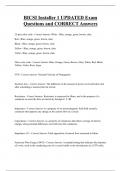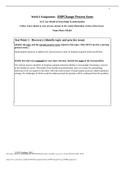BICSI Installer 1 UPDATED Exam
Questions and CORRECT Answers
25-pair color code - Correct Answer- White - Blue, orange, green, brown, slate
Red - Blue, orange, green, brown, slate
Black - Blue, orange, green, brown, slate
Yellow - Blue, orange, green, brown, slate
Violet - Blue, orange, green, brown, slate
Fiber color code - Correct Answer- Blue, Orange, Green, Brown, Slate, White, Red, Black,
Yellow, Violet, Rose, Aqua
NVP - Correct Answer- Nominal Velocity of Propagation
Insertion loss - Correct Answer- The difference in the amount of power received before and
after something is inserted into the circuit.
Resistance - Correct Answer- Resistance is expressed in Ohms, and is the property of a
conductor to resist the flow of electricity through it. V=IR
Inductance - Correct Answer- Is a property of an electromagnetic field built around a
conductor that opposes any change in the current flow in a circuit
Capacitance - Correct Answer- is a property of conductors that allows storage of electric
charges when potential differences exist between the conductors.
Impedance (V) - Correct Answer- Total opposition of current flow measured in Ohms
American Wire Gauge (AWG) - Correct Answer- A standard rating that indicates the diameter
of a wire, such as the conducting core of a coaxial cable or the twisted pairs in a UTP cable.
,Megahertz (MHz) - Correct Answer- one million hertz, especially as a measure of the
frequency of transmissions
Megabit (Mb) - Correct Answer- Approximately one million bits. Often used as a
measurement of data transfer throughput.
Bandwidth - Correct Answer- The amount of data that can be transmitted over a network in a
given amount of time.
Decibel (dB) - Correct Answer- A unit used to compare the loudness of different sounds.
Crosstalk - Correct Answer- when data bleeds from one pair to another in a cable
Alien Crosstalk (AXT) - Correct Answer- Unwanted signal coupling from one permanent link
to another
USOC - Correct Answer- Universal Service Order Code
Coaxial cable types - Correct Answer- Series-6 and Series-11
Coaxial connectors - Correct Answer- Series-6 uses BNC and F connectors
Series-11 uses F and N connectors
Fiber connectors - Correct Answer- SC, ST, and SST(LC or
cladding - Correct Answer- The glass or plastic shield around the core of a fiber-optic cable.
Cladding reflects light back to the core in patterns that vary depending on the transmission
mode. This reflection allows fiber to bend around corners without impairing the light-based
signal.
Multimode Fiber (MMF) - Correct Answer- Larger core with multiple paths of light.
Common for backbone and horizontal cabling in buildings. OM2 - Not recommended for new
installs. OM3 - Higher bandwidth. OM4 - Highest bandwidth for MMF. 2000m/6500ft
limitation. 850 nm and 1300 nm (nanometers)
, Singlemode Fiber - Correct Answer- Smaller core with only one path of lights. Horizontal,
riser, campus environments.
9 um core, 125 um cladding.
OS1 - LAN, tight buffered construction, 1310/1550 nm
OS2 - Outside Plant, 1310, 1490, 1550, 1625 nm
3000m/9842ft limtations.
Ribbon Fiber - Correct Answer- Multiple 250 um fibers bonded into a flat color coded ribbon.
Can splice a bunch at a time.
Fiber - Tight buffer diameter - Correct Answer- 900 um
Fiber - Acrylate coating diameter - Correct Answer- 250 um
OM1 - Correct Answer- 850 nm OFL - 200 MHz•km (3.5dB/km)
1300 nm - 400 MHz•km (1.5dB/km)
OM2 - Correct Answer- 850 nm OFL - 500MHz•km (3.5dB/km)
1300nm - 500MHz•km (1.5dB/km)
OM3 - Correct Answer- 850 nm OFL - 1500MHz•km (3.5dB/km)
850 nm RFL - 2000MHz•km (3.5dB/km)
1300 nm - 500MHz•km (1.5dB/km)
OM4 - Correct Answer- 850 nm OFL - 3500MHz•km (3.5dB/km)
850 nm RFL - 4700MHz•km (3.5dB/km)
1300 nm - 500MHz•km (1.5dB/km)
Modal Distortion - Correct Answer- A light distortion problem unique to MMF fiber-optic
cable. Happens when light signals are sent at the same time.





